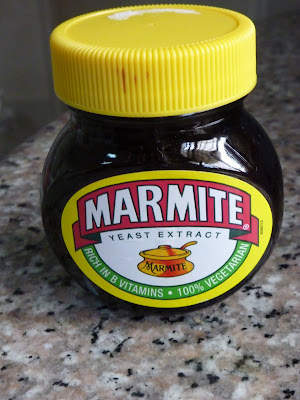
Previously, I thought that marmite was a joke. It was the British equivalent to the spam joke. A food that people made fun of in conversation, gave as a gag gift, or put the label on the front of a t-shirt. It was not real food.
Then I met a British man named "Bob". I met him two hours after becoming curious in the grocery store. In that moment, I purchased the smallest jar of marmite, brought it home, tried a bit on toast, and washed out my mouth to rid it of the taste. "Bob" introduced himself and marmite came up in our conversation. I was scarred from the experience but he did not comfort me. In a fit of nationalism, he sided with the concoction and gave example of culinary uses for it. Small portions, that was my problem according to "Bob". This is why British "Bob" has an alias.
Enter another British friend who started to tout the virtues of marmite as a healthy product, full of vitamin B. Together they made an insufferable pair promoting the consumption of yeast extract the color of car oil. Marmite stayed on my mind but never again touched my lips.
Later, the product came back into mind on a quiet flight while reading a book. I was reading a history of cancer. In this book about a deadly and tragic disease came the mention of marmite. It was used by an British doctor in 1928 to cure anemia in Bombay, India that was caused by a severe lack of folic acid. This event was used to explain what cancer is and how it occurs in the body by explaining other cellular diseases of a similar nature. I smiled while reading the passage and highlighted it for further reference.
My marmite did not have such a noble purpose. In the cupboard of a friend sits the jar, mostly full. It does not need refrigeration and no one in the house is suffering from insufficient folic acid consumption. The jar is there to remind me of the conversation. After reading the passage about the medical use for marmite, I might one day reconsider trying it again. Until then, it will sit as a joke on a shelf, like spam.
No comments:
Post a Comment